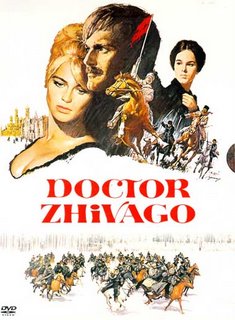
Decided to rewatch Doctor Zhivago last night. It's been 40 years since I originally read Boris Pasternak's book upon which it is based. I will always remember the first time I watched the movie in 1969 at the Fairview Cinema in Kitchener, Ontario. Seeing it on a big screen was a magnificent sight but the true adventure began when we went to go home. We'ed failed to reck the length of this presentation and when the bus got to the southern terminus of the KW Streetcar Line the transit system shut down for the night stranding us some 15 miles from home. Home furthermore was another mile and a half from the northern end of the line. There was nothing for it but to call a cab; something that, on a student's means, I really couldn't afford. I at least had the money but the welfare family, who were my fellow passengers, didn't. So I took the four of them in the cab to their home and then walked to my own.
There is no doubting, beginning with the title, who the principal character of this story is; nor is there much doubting that it is the poet who engages us, not the doctor. He is presented to us matter of factly, warts and all. However it is his adopted father, Alexander Gromeko, who provides us with a running commentary on events and the ordinary citzen's reactions to them--I cannot say common man because Gromeko was obviously a man of some wealth and position before the Revolution swept it all away. It is also made quite obvious that he was a lover of books. He comes particularly into his own when the family migrates to Verikino. Pedro, the old family retainer, who sees to their support at the estate is particularly priceless and the young colt, that gambols before and behind the wagon which his mother pulls is an inspired touch; whether intended or a serendipitous happenstance.
This is movie making in the old style where the movie begins with an Overture, has an actual Intermission and ends with Exit music. In the days before Computer Generated Images the attention to detail here is difficult to comprehend. In the feature disc we learn that the movie was shot predominantly in Spain in 100º heat. That the flowers at Verikino were "planted"; the leaves pinned to the trees to match the seasons. The winter scenes were created by laying out acres of cotton baton across the fields and the ice, icicles, and coatings of snow were created with paraffin. It's a tribute to the cinematography that we never suspect any of this. Only a Russian would recognize that these are not the Urals we see from the cattle car that is called a train.
I'll not comment on the political struggle that serves as backdrop for this story; somehow Yuri makes it seem inconsequential. I do wish, though, that I could read the Lara Poems!

No comments:
Post a Comment